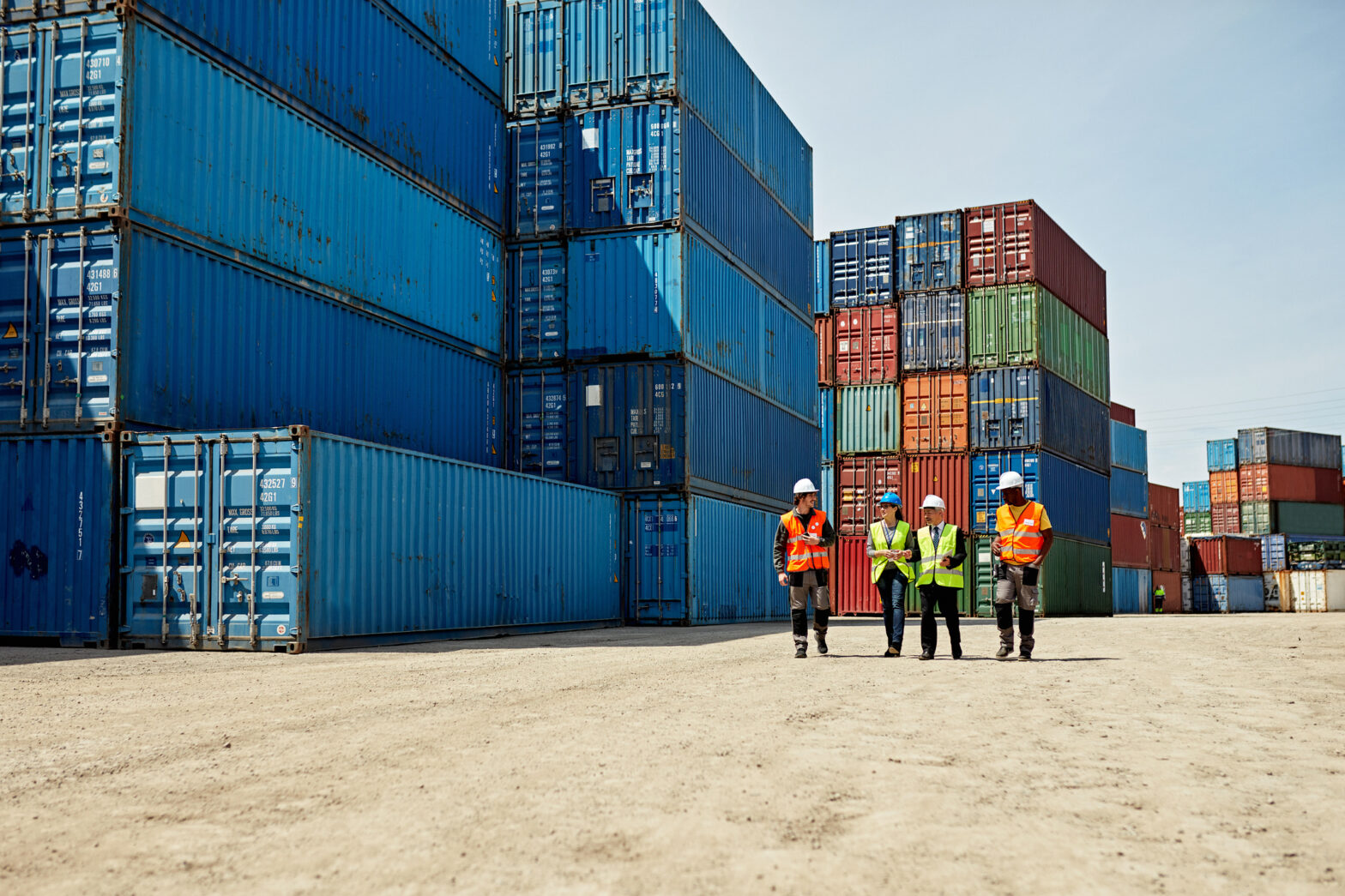If you’re already doing business abroad, you’ve likely heard of freight forwarders before. They promise to take much of the stress out of international shipping – and deal with all aspects of the transportation and delivery of your goods. In most cases they’ll also deal with customs clearance. But do you really need to use a freight forwarder for your shipment? Or is it an unnecessary waste of cash?
If you’re not sure whether a freight forwarder is necessary for your shipment, read on. In this article we’ll delve into what a freight forwarder actually is and does, how their costs are calculated, and where you might find a reputable agent if you decide you want to get some help with your shipment.
What is a freight forwarder?
A freight forwarder is an individual – or, more likely, a company – which arranges for goods to be transported from one place to another.
While this might sound straightforward enough, there’s actually a whole lot that goes on behind the scenes to make sure that product delivery you’re expecting makes it safely from your supplier to your office. A good freight forwarder, however, will make the process look seamless, efficient and simple.
It’s helpful to understand that there are both freight forwarders and customs brokers working in many markets. Customs brokers typically deal with the import and export side of international deliveries, including commodity codes, and EORI requirements – while freight forwarders are specialists in the logistics. However, many freight forwarders can also act as customs brokers, and pick up the end to end process of moving your goods including both logistics and customs requirements.
What does a freight forwarder do?
A freight forwarder will take control of getting your shipment from its origin to your store, home or office. That can involve any or all of the following steps:
- Arranging transport from the origin – such as your supplier’s factory or warehouse – to the port or airport for shipment
- Preparing documents, licenses and all relevant paperwork for export at the point of origin
- Negotiating, booking and loading cargo for sea or air freight
- Optimising cargo storage and flow – sometimes including packing of goods as well for specialist and /or dangerous items
- Setting up insurance and tracking delivery as needed
- Preparing documents (of carriage for example), licenses and all relevant paperwork for UK customs authorities
- Arranging haulage and delivery to your agreed location in the UK
How can they help?
The basic duties of a freight forwarder are set out above – but where they’re really helpful is in having the connections and experience to navigate the import/export process.
Often it’s not the freight forwarder themselves carrying out many of the steps listed above. They’ll often subcontract things like local haulage to a partner based in your supplier location, for example. But what makes a freight forwarder helpful – and often crucial – is that they have the contacts across the globe to find the right person needed to get the job done, whether you’re importing from Sao Paulo or Shanghai. There are also full-service online platforms available for SMEs to get quotes, book, pay and track shipments all from one place, such as Shipa Freight.
Having a skilled freight forwarder will cost you in upfront fees – but it should make the import process run smoothly, and reduce the risk of any unforeseen costs or nasty surprises.
For many entrepreneurs starting out in importing, using a freight forwarder can prove a helpful investment.
Tip: If you’re just getting your import business off the ground, it is worth researching the newer money transfer and digital finance companies now available. If you’re trading internationally and paying invoices to suppliers based abroad, using your regular bank could be more expensive. Even if their fees are low, they could be adding a margin to the exchange rate which makes the transfer more expensive.
In addition, if you’re finding that as your business grows you need to pay international suppliers more frequently, it might be worth considering a multi-currency borderless account. With this, you can can hold lots of currencies, switch between currencies instantly, and pay no fees to receive money, and switch between currencies as and when you need to. These days, paying overseas suppliers has never been easier.
What are the advantages of using a freight forwarder?
If you’re new to importing to the UK, or you just want the process to be as simple as possible, you might benefit from using a freight forwarder. Here are some advantages to consider:
- You’ll only need to deal with one person to arrange your shipment, rather than several different haulage and freight companies
- Many freight forwarders are experts in import/export paperwork, and can help you navigate the complex processes involved
- With their local connections, freight forwarders can find service providers all over the globe to complete your shipment
- Freight forwarders can negotiate on shipping, haulage and warehousing costs on your behalf
- Using a freight forwarder offers peace of mind – if something goes wrong, or you need to submit an insurance claim, they should be able to help out
What are the disadvantages of using a freight forwarder?
Of course, there are also some downsides to choosing a freight forwarder. Bear in mind the following:
- Using a freight forwarder can increase the overall costs of your shipment
- Using a freight forwarder means you don’t have control over the details of your shipment – you’ll be leaving all the details to a third party and need to trust them
- If you have the connections needed to arrange and negotiate your own shipment and haulage locally, you might be able to get better deals keeping the process in-house
- If you use a large forwarding company, for a relatively small shipment, your needs might not be prioritised
- Not all freight forwarders cover every market – and not all markets are well regulated. You’d need to check the credentials of your chosen supplier to make sure they can actually deliver what they say they can
How much does it cost to use a freight forwarder?
When you use a freight forwarder, in most cases, you’ll agree a quote for the entire end to end process of moving your shipment from its origin to your store or warehouse. That means that the costs are made up of something like 20 different elements on average.
It’s crucial you get an itemised quote from your freight forwarder, so you can see what is – and is not – covered. The core job of a freight forwarder is to arrange the transport logistics associated with your shipment. However, many will also deal with all customs clearance paperwork. It’s important to know exactly what services your chosen provider can offer. You can then compare quotes fairly, before signing a contract with your chosen provider.
On your itemised quote and contract you should see charges for things like these:
- Transport costs – often covering haulage to a port or airport at the supplier location, air or sea freight costs, and local transport in the UK to get to your delivery point. Costs might be calculated using cargo weight or volume – or both
- Product specific costs – very heavy items might need a crane for loading, perishable items might require refrigerated transport, or hazardous items could mean additional precautions and licenses are needed
- Palletisation or packing. Depending on how you’re shipping your items, they might need to be put on pallets to be loaded into a container, or packed for air freight
- Storage if needed before and after shipping
- Extra fees for specific routes, such as the Panama Canal, for peak delivery times, or because of the costs incurred when using specific ports
- Documentation costs, including export and import paperwork
- Insurance and surcharges to cover things like fluctuations in the price of fuel, or the currency exchange rates
- Administration or handling fees – payable to the freight forwarder specifically, and likely to be in the region of $35-75
Is a freight forwarder right for me?
If you’re new to importing, working with a supplier in an area where you’re not well connected, or simply want to make the import process go as smoothly as possible, using a freight forwarder might be a smart plan.
As you become more familiar with the export and import processes from your suppliers, and if you can build up a network of local haulage companies, and sea or air freight providers, you might become more confident about going it alone.
It’s good to know that in some markets, you can choose to employ a customs broker. They’ll deal with the customs documentation but not the transport logistics. This might be a consideration if you’re already well connected with local transport companies, but not to sure about the customs legislation relevant to your shipments.
How to find a freight forwarder
The biggest freight forwarding companies globally are DHL, Freightos, Kuehne + Nagel, DB Schenker, DSV and Sinotrans. These are good places to look if you want to get a feel for the market rates you can expect to pay.
A great way to get started is to get a number of quotes from a freight quote calculator (like this one from Freightos), which will provide several options from different companies to help you get a picture of the costs for your particular shipment. You’ll just need to enter the details of your shipment once, and the site will help you find quotations which can fit your needs.
It’s crucial you check exactly what the freight forwarder quote covers in each instance, and do some due diligence research. As we mentioned earlier, not all freight forwarding agencies are well regulated, so you’ll want to make sure your quotes are coming from a reputable supplier.
One good place to find experienced operators is on the British International Freight Association (BIFA) website.
Notes on Post-Brexit effects
Over two years have past since then end of the transition period (1 January 2021) and as you might expect, the process of moving goods to and from the EU has smoothed somewhat with experience.
If your business will be doing international trade with countries within the EU customs Union, this guide from Sage provides an excellent run-through of the main steps for freight forwarding for small businesses after Brexit.
Summary
Life is busy for any entrepreneur – and never more so than if you’re working in import/export, and needing to deal with suppliers all over the globe. Using a freight forwarding agency can take a load off your mind, as you’ll know a specialist has picked up the haulage, shipping and even customs processes for your goods. You can then get back to growing your business, safe in the knowledge your shipment is in good hands.




